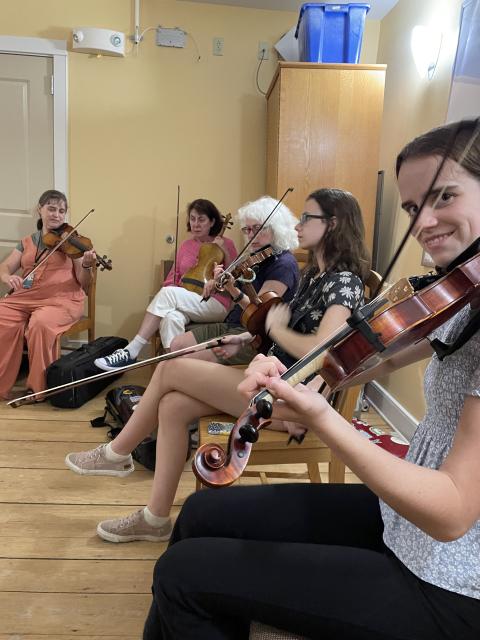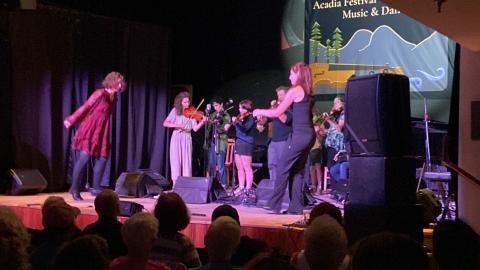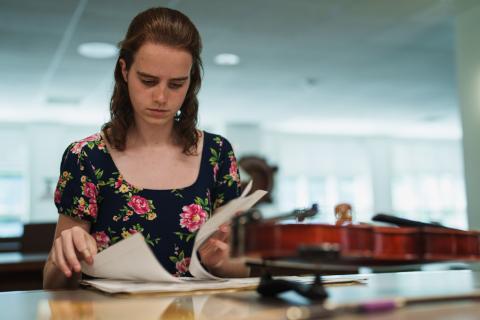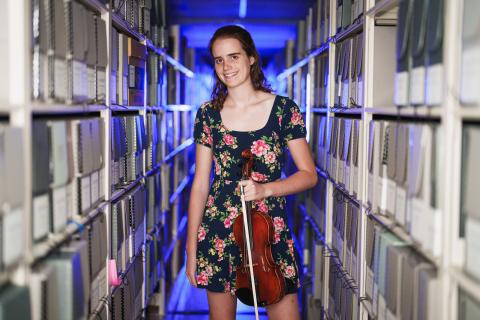UNH Undergraduate Research in the Arts
How can you conduct research in the arts? What can you learn through undergraduate research opportunities at UNH?
Meet Emilie Carroll '27, a music major, and learn more about how she received funding from the Research Experience and Apprenticeship Program (REAP) to study the history and evolution of New England Contra Dance.
learn more about undergraduate research at UNH

Emilie Carroll '27
What is your research about?
I received a Research Experience and Apprenticeship Program (REAP) grant to study the history and evolution of New England Contra Dance. Contra dance is a form of social dancing similar to square dancing that has been done in New England for centuries and continues to be done all over the world. Specifically, I focused on a subset of tunes called Chestnuts, which are old and common tunes that continue to be used throughout the dance repertoire. For my project, I did archival research through the Library of Traditional Music and Dance in the Dimond Library archives and I also conducted ethnographic fieldwork at fiddle camps and gatherings in New England and in the surrounding area over the summer.

Playing in a late-night jam session at Acadia Festival of Traditional Music and Dance. I learn by ear, which means I don't use sheet music, so I have fun learning lots of new tunes with other people at these sessions.
What did you learn through your research experience?
I learned so much about contra dance as a tradition. Before beginning my project, I had some knowledge of contra dancing, as I play Celtic fiddle and there is a lot of overlap between that and the New England fiddle tradition. However, I learned a lot about the history of contra dance and the importance of the old tunes and dances in the tradition. This kind of knowledge is valuable for me as a traditional musician because I feel like a lot of younger musicians who play “contemporary” traditional music do not have that context and history, and I believe we should all know where we are coming from to know where we are going in traditional music.
Additionally, I gained so many skills in both archival and ethnographic research. I had never done either of those kinds of research before and so that was a steep learning curve for me. I needed to get IRB (Institutional Review Board) certification to work with human subjects, learn how to conduct interviews with my subjects and learn how to work with old documents in the UNH archives. I am so glad I had the chance to learn these skills through my research project and am incredibly grateful for the help of my mentor, Professor Rose Pruiksma, and my fiddle teacher, Katie McNally.

One of the many concerts at Acadia Festival of Traditional Music and Dance, showcasing the many talented faculty and staff
What was the best part of your research project?
The best part of doing this project was being able to conduct ethnographic research and fieldwork. I did my fieldwork at various fiddle camps around the country, where I feel very comfortable and spend many of my summers anyway. Fiddle camps are very intense and there is a lot of music to learn and play, and the days are packed with activities and socializing. So, to add fieldwork observation (which is an all-encompassing process) and fieldwork interviews to the day is particularly challenging.
However, it was also rewarding because I got to make some amazing connections with professional musicians who are knowledgeable on contra dance, and everyone was so excited and willing to be a part of my project that it was very easy and fun to talk to my subjects. I had so many people help me with my project that I cannot even name them all in my paper! It just speaks to the community nature of folk music that so many people were willing to step up and offer me their expertise.

Studying in the library for my research project
What was the most challenging part of your research project?
The fieldwork part was challenging, but I think the most challenging part of the project was the archival research that I did in the Milne Special Collections in Dimond Library. I had some help from my mentors, but mostly I was in the library by myself all day. I needed to look through more than 25 boxes of archival materials that I ordered from the collections and decide what was useful to document and what was not useful for the project.
The Library of Traditional Music and Dance in Milne is so amazing, and there are so many things to look at. However, when I first started the process, I did not know what I was looking for, so I got distracted by all the routes I could take my research, and it was overwhelming. I did learn a lot from this challenge, though, because I was forced to become independent in my research right away and develop a clear idea of what I was looking to accomplish.

Emilie Carroll '27
What’s next for you?
I am lucky that I found opportunities in the Hamel Center for Undergraduate Research early during my time at UNH, so I still have a lot of time to explore my options! I would love to conduct more research on a slightly different topic, maybe more related to cultural anthropology and its relationship to musical traditions such as contra dance. Because I know more about contra dance now, I would love to start up a contra dance here at UNH!
I co-founded the Fiddle and Folk Club this semester, and we are starting to plan events so that members of the community can enjoy contra dancing, too. Additionally, I plan to go abroad next spring (to Ireland or Scotland). There are excellent traditional music archives over there, and I would love to work in those archives and continue to do ethnomusicology research in one way or another. I would love to continue to explore my passion for Irish and Scottish music in addition to contra dance. There are so many opportunities for research in music both at UNH and abroad, which I am so excited about!